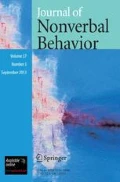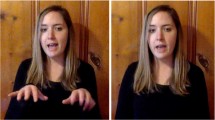Abstract
To investigate the influence of different kinds of gesture on children’s memory, 60 6- to 7-year-old children participated in an event conducted by the experimenters (“visiting the pirate”) and were interviewed to assess memory for the event approximately 2 weeks later. Children were assigned to 1 of 4 conditions; in 3 conditions, gesture was possible (gesture-instructed, gesture-modelled, gesture-allowed) whereas in the fourth condition (gesture-not allowed), children’s hands were constrained. The amount of gesture engaged in was limited but was greatest in the gesture-instructed condition. Children in the gesture-instructed condition, who were asked to gesture during the interview, recalled more than did those in the other conditions. Further, relative to children in the gesture-modelled and gesture-allowed conditions, children in the gesture-instructed condition conveyed significantly more information in gesture that had not also been reported verbally. Although further research is necessary to understand the underlying mechanism, the findings suggest that instructing children to gesture as well as verbally recall an experience has cognitive and communicative benefits.
Similar content being viewed by others
References
B. P. Ackerman (1985) ArticleTitleChildren’s use of context and category cues to retrieve episodic information from memory Journal of Experimental Child Psychology 40 420–438 Occurrence HandleA1985AWB3000004
M. W. Alibali A. A. DiRusso (1999) ArticleTitleThe function of gesture in learning to count: More than keeping track Cognitive Development 14 37–56 Occurrence Handle10.1016/S0885-2014(99)80017-3 Occurrence Handle000082269100002
M. W. Alibali D. C. Heath H. J. Myers (2001) ArticleTitleEffects of visibility between speaker and listener on gesture production: Some gestures are meant to be seen Journal of Memory & Language 44 169–188 Occurrence Handle10.1006/jmla.2000.2752
M. W. Alibali S. Kita A. J. Young (2000) ArticleTitleGesture and the process of speech production: We think therefore we gesture Language and Cognitive Processes 15 593–613 Occurrence Handle000165627800001
K. D. Bird (2002) ArticleTitleConfidence intervals for effect sizes in analysis of variance Educational and Psychological Measurement 62 197–226 Occurrence Handle10.1177/0013164402062002001 Occurrence Handle000174569300001
Bird K. D., Hadzi-Pavlovic D., & Isaac A. P. (2000). PSY [Computer software]. Available from http://www.psy.unsw.edu.au/research/psy.htm
Broaders, S. C. (2003). Making children gesture: Effects on cognitive variability. Poster presented at the Biennial Conference of the Society for Research in Child Development, Tampa, FL
S. Butler J. Gross H. Hayne (1995) ArticleTitleThe effect of drawing on memory performance in young children Developmental Psychology 31 597–608 Occurrence Handle10.1037/0012-1649.31.4.597 Occurrence HandleA1995RE72700007
D. Frick-Horbury R. E. Guttentag (1998) ArticleTitleThe effects of restricting hand gesture production on lexical retrieval and free recall American Journal of Psychology 111 43–62 Occurrence Handle000073902600003
S. Goldin-Meadow (1999) ArticleTitleThe role of gesture in communication and thinking Trends in Cognitive Sciences 3 419–429 Occurrence Handle10.1016/S1364-6613(99)01397-2 Occurrence Handle10529797 Occurrence Handle000083266600006
S. Goldin-Meadow (2002a) From thought to hand: Structured and unstructured communication outside of conventional language E. Amsel J. P. Byrnes (Eds) Language literacy, and cognitive development mahwah Erlbaum New Jersey 121–150
S. Goldin-Meadow (2002b) ArticleTitleConstructing communication by hand Cognitive Development 17 1385–1405 Occurrence Handle000178834900007
S. Goldin-Meadow D. McNeil J. Singleton (1996) ArticleTitleSilence is liberating: Removing the handcuffs on grammatical expression in the manual modality Psychological Review 103 34–55 Occurrence Handle10.1037/0033-295X.103.1.34 Occurrence Handle8650298
S. Goldin-Meadow H. Nusbaum S. D. Kelly S. Wagner (2001) ArticleTitleExplaining math: Gesturing lightens the load Psychological Science 12 516–522 Occurrence Handle10.1111/1467-9280.00395 Occurrence Handle11760141 Occurrence Handle000172112700014
J. Gross H Hayne (1998) ArticleTitleDrawing facilitates children’s verbal reports of emotionally laden events Journal of Experimental Psychology: Applied 4 163–174 Occurrence Handle10.1037/1076-898X.4.2.163 Occurrence Handle000074037500005
C. H. Jones M.-E. Pipe (2002) ArticleTitleHow quickly do children forget events? A systematic study of children’s event reports as a function of delay Applied Cognitive Psychology 16 755–768 Occurrence Handle10.1002/acp.826 Occurrence Handle000179550600002
S. D. Kelly R. B. Church (1998) ArticleTitleA comparison between children’s and adults’ ability to detect conceptual information conveyed through representational gestures Child Development 69 85–93 Occurrence Handle9499559 Occurrence Handle000072200900008
S. D. Kelly M. Singer J. Hicks S. Goldin-Meadow (2002) ArticleTitleA helping hand in assessing children’s knowledge: Instructing adults to attend to gesture Cognition & Instruction 20 1–26
S. Kita A. Ozyurek (2003) ArticleTitleWhat does cross-linguistic variation in semantic coordination of speech and gesture reveal? Evidence for an interface representation of spatial thinking and speaking Journal of Memory & Language 48 16–32 Occurrence Handle10.1016/S0749-596X(02)00505-3
M. D. Liwag N. L. Stein (1995) ArticleTitleChildren’s memory for emotional events: The importance of emotion-related retrieval cues Journal of Experimental Child Psychology 60 2–31 Occurrence Handle10.1006/jecp.1995.1029 Occurrence Handle7666037 Occurrence HandleA1995RK72300002
D. McNeill (1992) Hand and mind University of Chicago Press Chicago
T. Murachver M. Pipe R. Gordon J. L. Owens R Fivush (1996) ArticleTitleDo, show, and tell: Children’s event memories acquired through direct experience, observation, and stories Child Development 67 3029–3044 Occurrence HandleA1996WN23500024
H. H. Ratner M. A. Foley P. McCaskill (2001) ArticleTitleUnderstanding children’s activity memory: The role of outcomes Journal of Experimental Child Psychology 79 162–191 Occurrence Handle10.1006/jecp.2000.2585 Occurrence Handle11343407 Occurrence Handle000168766900003
F. H. Rauscher R. M. Krauss Y. Chen (1996) ArticleTitleGesture, speech, and lexical access: The role of lexical movements in speech production Psychological Science 7 226–231 Occurrence HandleA1996VA43500008
R. Risemberg B. J. Zimmerman (1992) ArticleTitleUsing mime to improve children’s writing of autobiographical narratives Journal of Research and Development in Education 25 232–239
C. M. Roebers O. Fernandez (2002) ArticleTitleThe effects of accuracy motivation and children’s and adults’ event recall, suggestibility, and their answers to unanswerable questions Journal of Cognition & Development 3 415–443 Occurrence Handle10.1207/S15327647JCD3,4-03
K. Salmon (2001) ArticleTitleRemembering and reporting by children: The influence of cues and props Clinical Psychology Review 21 267–300 Occurrence Handle11293368 Occurrence Handle000167743300005
K. Salmon S. Bidrose M. Pipe (1995) ArticleTitleProviding props to facilitate children’s event reports: A comparison of toys and real items Journal of Experimental Child Psychology 60 174–194 Occurrence Handle10.1006/jecp.1995.1037 Occurrence HandleA1995RK72300010
K. Salmon W. Roncolato M. Gleitzman (2003) ArticleTitleChildren’s reports of emotionally laden events: Adapting the interview to the child Applied Cognitive Psychology 17 65–69 Occurrence Handle10.1002/acp.845 Occurrence Handle000180552100005
W. Schneider D. Bjorklund (1998) Memory W. Damon D. Kuhn R. Siegler (Eds) Handbook of child psychology: (Vol 2) Cognition, perception and language EditionNumber5 Wiley New York 467–521
E. Tulving D. M. Thomson (1973) ArticleTitleEncoding specificity and retrieval processes in episodic memory Psychological Review 80 IssueID5 352–373 Occurrence HandleA1973Q939300003
S. M. Wagner H. Nusbaum S. Goldin-Meadow (2004) ArticleTitleProbing the mental representation of gesture: Is handwaving spatial? Journal of Memory and Language 50 395–407 Occurrence Handle10.1016/j.jml.2004.01.002 Occurrence Handle000221246100003
M. Wesson K. Salmon (2001) ArticleTitleDrawing and showing: Helping children to report emotionally laden events Applied Cognitive Psychology 15 301–320 Occurrence Handle10.1002/acp.706 Occurrence Handle000169250900005
Author information
Authors and Affiliations
Corresponding author
Additional information
Elizabeth Stevanoni and Karen Salmon are affiliated with the School of Psychology, University of New South Wales, Sydney, Australia.
We thank the children, parents, teachers and principals at the participating schools, St Michaels and Villa Maria Primary Schools, and acknowledge Kay Pegg for help with data collection.
Rights and permissions
About this article
Cite this article
Stevanoni, E., Salmon, K. Giving Memory a Hand: Instructing Children to Gesture Enhances their Event Recall. J Nonverbal Behav 29, 217–233 (2005). https://doi.org/10.1007/s10919-005-7721-y
Issue Date:
DOI: https://doi.org/10.1007/s10919-005-7721-y




